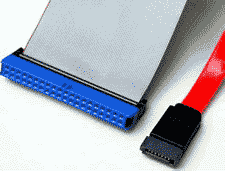Universal driver, your way out of the dusk
 But there are people in the world who alone saw their ingenious long-term construction projects, quit, continue again ... But no one knows about their projects. Alter , author of the UniATA driver, one of them.
But there are people in the world who alone saw their ingenious long-term construction projects, quit, continue again ... But no one knows about their projects. Alter , author of the UniATA driver, one of them. While preparing the next topic with news from the life of the ReactOS team, I was amazed to realize the fact that such a brilliant development as UniATA was not only never mentioned on the hub, but it also enjoys undeserved oblivion on the Internet. UniATA is a universal ATA device driver in every sense of the word, developed since 2002. A key feature is that the driver does not require reinstalling the OS when changing the IDE controller or motherboard.
The project urgently needs testers!
UPDAlter discovered this topic and got +10 morale, as a result Version 0.42h came
out
- The first AHCI ATAPI tests were successful.
- SATA and AHCI ATAPI no longer switch to PIO mode to execute commands other than read and write.
- Added support for emulating SCSI commands READ16 / WRITE16 / VERIFY16 / READ_CAPACITY16. This is necessary to expand the LBA address space to 64 bits, which makes it possible to work with drives larger than 2TB, which use more than 32 bits for LBA. Note: top-level disk drivers must also support this feature.
UniATA currently provides support for:
- NT3.51 (including on i386), NT4, 2000, XP, 2003, 2005, Vista, 7, ReactOS
- the entire line of DMA, UDMA0-UDMA6 (ATA-16/25/33/44/66/100/133) modes on well-known controllers and basic DMA on compatible
- hard drives larger than 128Gb (LBA-48, EnableBigLba)
- SerialATA (SATA, SATA-2, SATA-3), AHCI rev. 0.95 - 1.30
- a large list of IDE controllers, as well as any other ATA / ATAPI compatible controllers.
- hot swap IDE devices on OS younger than w2k
- internal command queue and execution of read / write operations in a more optimal sequence
- atactl user-mode utility for managing ATA / ATAPI devices. You can find to change the data transfer mode (PIO / DMA / UDMA).
- settings for caching, speed and much more in the Registry
- a list of bad / unreliable blocks so that the driver does not torment the disk, but immediately returns an error (Nikolai Vorontsov).
Why and who needs such a driver? I tell you: it makes sense to install UniATA if the drivers for your old OS are not attached to the new motherboard. Or vice versa - there is an old board on which you need to install a new Windows. Of course, there are standard built-in drivers that will probably recognize this hardware and will work with it. But how ... In PIO mode, i.e. 0.5-3 Mb / s And UniATA will work in DMA or UltraDMA mode, which is significantly (sometimes even 10 times) faster. And here's another problem - new screws larger than 128 GB (LBA-48 or BigLba). In older OSes, their support is not provided at all, and new ones require the latest Service Packs. Support for such screws in UniATA is built-in. And finally - the situation of changing the motherboard. This is usually a non-trivial task. If you just make a replacement, The drivers from the previous board will not recognize the new IDE controller and the system will not boot. You will have to return the board back, force change the drivers to standard ones, change the board again and install new ones. You can forget about going to your friends (or to work) with your bootable hard drives (or be content with a speed of 0.5-3 Mb / s). Since UniATA supports a large list of controllers and, in addition to the list, understands almost any standard (regular onboard primary / secondary), this problem is also solved. UniATA also understands the new SATA and AHCI controllers. Below you can read a more detailed (and more technical) list of utilities. in order to visit friends (or to work) with your bootable hard drives, you can forget (or be content with a speed of 0.5-3 Mb / s). Since UniATA supports a large list of controllers and, in addition to the list, understands almost any standard (regular onboard primary / secondary), this problem is also solved. UniATA also understands the new SATA and AHCI controllers. Below you can read a more detailed (and more technical) list of utilities. in order to visit friends (or to work) with your bootable hard drives, you can forget (or be content with a speed of 0.5-3 Mb / s). Since UniATA supports a large list of controllers and, in addition to the list, understands almost any standard (regular onboard primary / secondary), this problem is also solved. UniATA also understands the new SATA and AHCI controllers. Below you can read a more detailed (and more technical) list of utilities.
Download the driver itself, source, see the version history at
alter.org.ua/ru/soft/win/uni_ata
